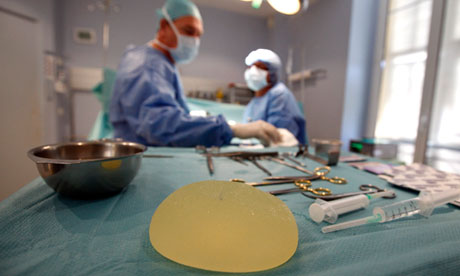
The PIP breast implants that were fraudulently filled with industrial-grade silicone may have caused their recipients harm, claim two environmental scientists and campaigners who dispute the findings of the independent inquiry into the scandal, which concluded there was no significant risk.
Writing in the Journal of the Royal Society of Medicine, the pair say they are particularly concerned about a chemical in the silicone filling that has been identified as an endocrine-disruptor – a substance that could potentially have an effect on the development of a foetus in the womb.
The article, by Andre Menache, director of consumer protection organisation Antidote Europe, and Dr Victoria Martindale, an environmental campaigner, is opinion and not based on any new evidence, but the note of caution it sounds was supported by one of the main professional associations of plastic surgeons. The British Association of Aesthetic Plastic Surgeons (baaps.org.uk) says the remains of ruptured implants removed from women should have been tested.
"Whilst the article in question is entirely an opinion piece and not presenting any new data, at the BAAPS we do agree – as we have said before – that there remain many unanswered questions regarding the possible effects of these chemical compounds," said Rajiv Grover, president of the BAAPS.
"We reiterate our call for analysis to be conducted on collected samples taken 'in vivo' rather than off-the-shelf, as it would also be advantageous to examine what impact body temperature and conditions have on them. It was only change occurring in implants inside the body which triggered a recall of soya bean (Trilucent) implants years ago."
The BAAPS says that all the PIP implants should be removed. "We have remained constant in our view – these defective devices have no place within the human body," said Grover. "The whole sector and in particular the patients affected, deserve more thorough answers."
Around 47,000 women in the UK were given PIP breast implants, manufactured by a French company whose owner is now on trial in France. After the scandal broke in March 2010, some had them removed. The NHS offered removal for free, although not replacement, when it became clear that not all of the private clinics would agree to take them out without a charge.
An inquiry, under NHS medical director Sir Bruce Keogh, concluded that the implants did not cause actual harm. "We disagree with their conclusion," write Menache and Martindale in their article. They also have concerns, they say, about the regulatory and quality control procedures that failed to safeguard thousands of women from the health risks associated with PIP breast implants.
"Considering these known risks and the fact that most women receiving breast implants were of reproductive age, we would expect the MHRA and the Department of Health to fulfil its duty of care and thoroughly investigate these risks as well as provide full information to patients," said Menache.

